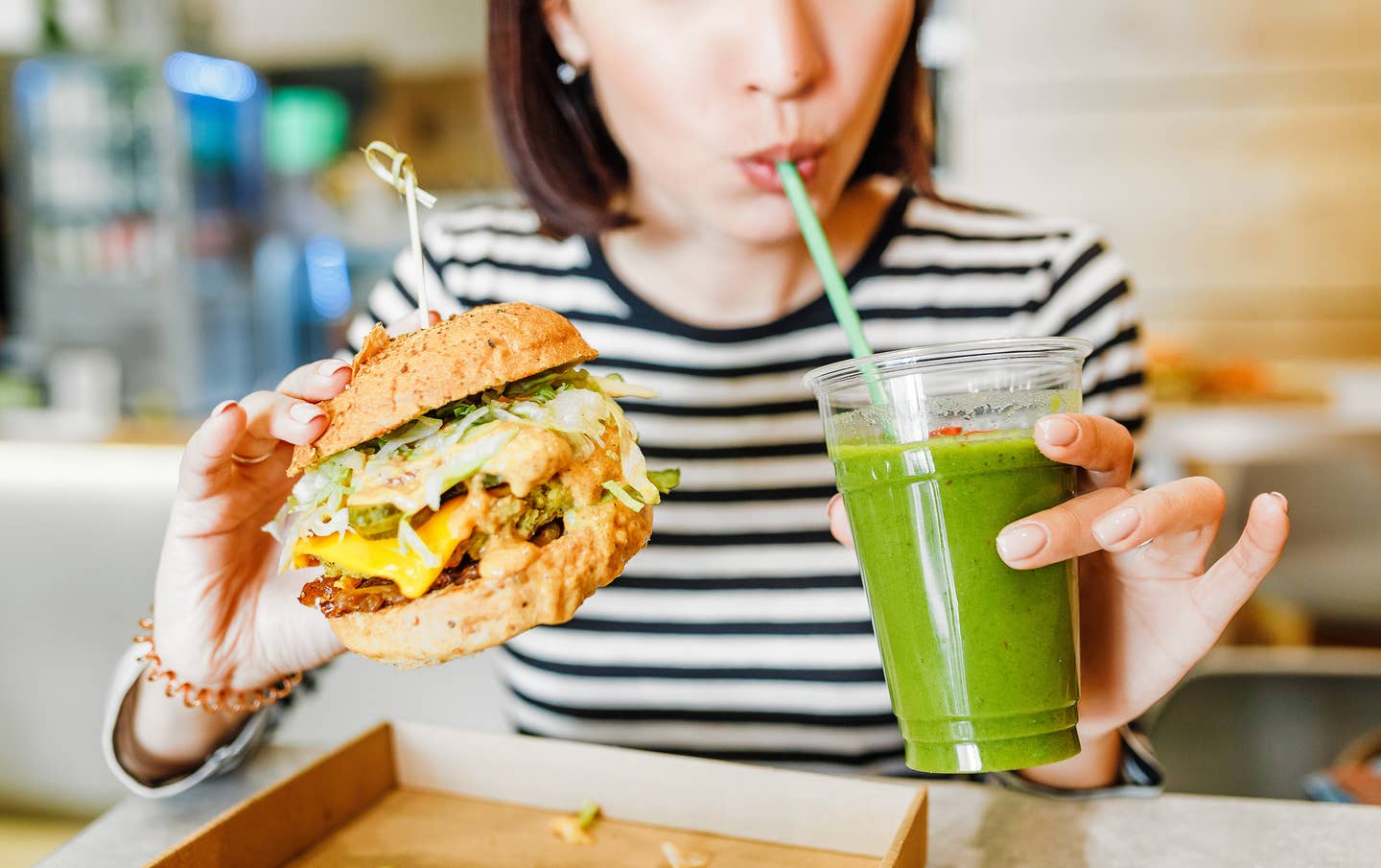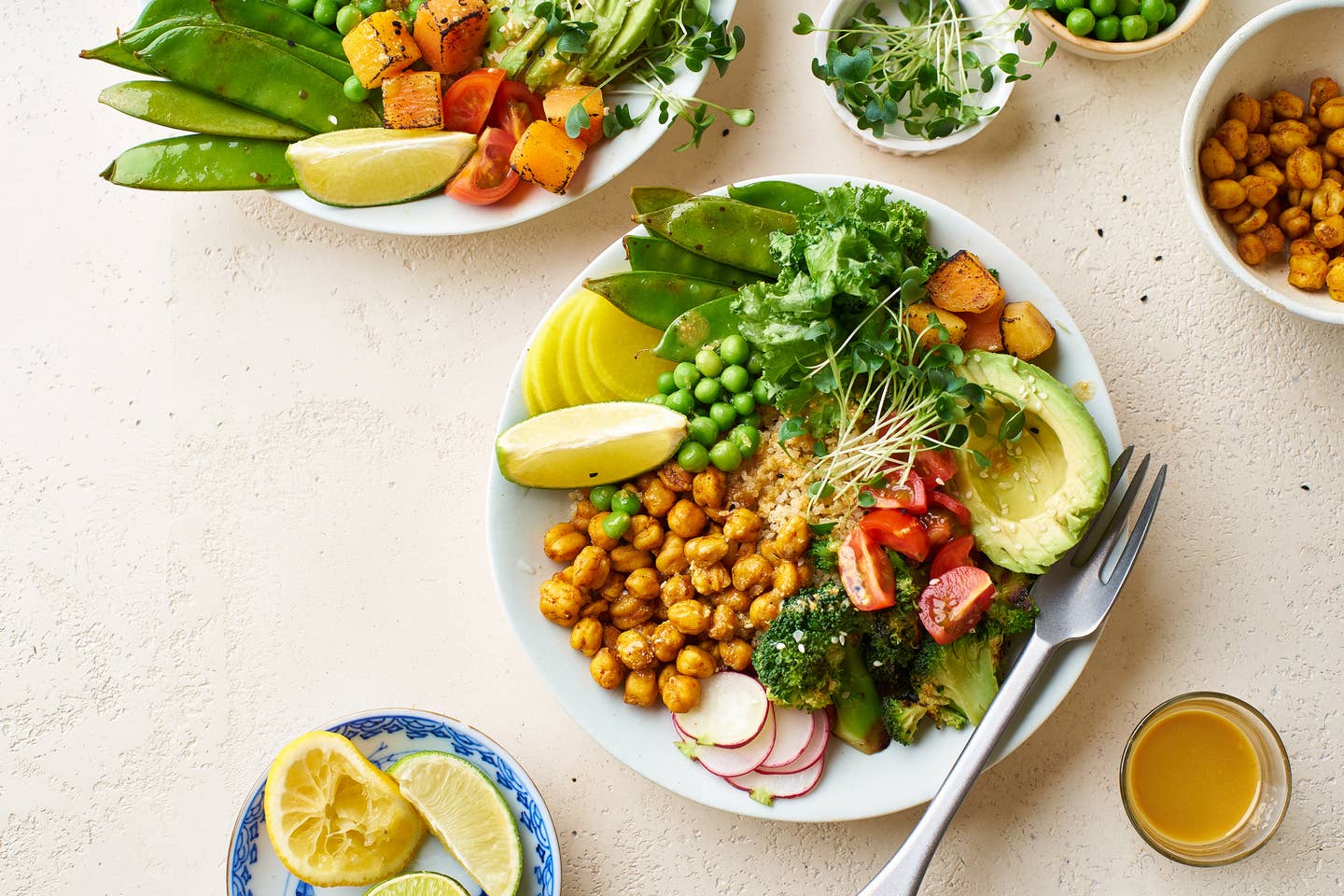
5 Reasons You Aren’t Losing Weight on a Plant-Based Diet
A vegan diet is an excellent way to eat for weight management – you just have to do it correctly. Many people assume eating vegan is a means to shed a few pounds, but that's not necessarily the case. As with any diet or lifestyle change, you have to eat a well-balanced, nutritionally sound diet and take in (or burn off) fewer calories than take in to lose weight. This means that just because you’re eating vegan if you’re not following the proper portion sizes, or not reaching for whole foods, you can still see weight creeping up on the scale unexpectedly.
Add overeating to the new forms of vegan food available (read: fast-food restaurants with new vegan options) and you’ll find convenient vegan offerings all over, albeit ones that may be still slightly unhealthy for you.
“Eating vegan used to be about eating a whole-food, plant-based diet with only vegetables, fruits, whole grains, legumes, nuts, seeds, herbs, and spices,” says plant-based nutrition expert Julieanna Hever, MS, RD author of The Complete Idiot’s Guide to Vegan Nutrition and The Healthspan Solution. “Now, vegan food is everywhere and it's accessible. For the first time in 14 years, I'm having clients come to me with the same health issues as clients who don’t follow a vegan diet, like weight issues and high cholesterol. I never saw that before, ever.”
Here, Hever shares how to eat vegan, lose weight and still get all the delicious food you crave.
Why Can't I Lose Weight on a Vegan Diet?
Problem #1: You’re not eating mostly healthy foods.
“One of the beautiful benefits of a whole-food, plant-based diet is that when you eat any combination of the infinite variety of vegetables, fruits, whole grains, legumes, mushrooms, nuts, seeds, herbs, and spices, you will get just what you need,” Hever says. This means you don’t have to stress about keeping score of your macronutrients like carbs, protein, and fat, you just have to eat whole foods as straight from the source as possible. “If you’re concerned about your weight, eat more whole plant foods that are nutrient-dense and calorically light to fill up while steering clear of the processed [and packaged plant-based] foods,” Hever recommends.
Problem #2: You’re falling prey to health halos.
People think that because something is labeled vegan, it's healthy, whether that’s on a restaurant menu or a label in the grocery store. “That’s not necessarily true, because ice cream is still ice cream,” says Hever. “Yes, the vegan version is better for you than the dairy version, but it's not going to make you healthy, and it's not going to help you avoid weight gain.” For example, a 2/3-cup serving of Ben & Jerry’s Vegan Chocolate Chip Cookie Dough has 350 calories, 33 grams of sugar, and 11 grams of saturated fat. It’s made with almond milk, coconut oil, and pea protein, but that doesn’t make it an ideal plant-based food. You’re better off having a cup of fresh fruit and pairing it with a plant-based glass of milk or yogurt for protein instead if you’re looking to lose or maintain weight loss.
Problem #3: Your portions are way too big.
Since you’re not trying to follow a “diet” while eating vegan you might be reveling in the fact that you don’t have to measure out portions of foods. The problem is, it’s all too easy for portions to get larger without us knowing it, and those extra calories can add up to weight gain, no matter what you’re filling your plate with. Think about it: If that sprinkle of walnuts on your morning oatmeal (probably a tablespoon) starts becoming a handful (closer to ½-cup) you’ll be taking in about 200 more calories easily.
That portion increase alone could tally up to 20 pounds in a year if you ate that breakfast daily! If you’re focused on whole plant foods and find you're gaining weight, eat smaller servings, suggests Hever. One area she finds her vegan clients tend to overdo is oil portions as well as nuts and seeds. Use measuring spoons and cups for these caloric, high-fat items when watching your waistline.
Problem #4: You’re going a little crazy on the carbs.
If you followed previous diets that were low in carbs before becoming a vegan, it can be refreshing to have them back on the menu as a plant-based eater—but all too easy to use them as a crutch. For example, cereal at breakfast, a vegan pizza at lunch, pasta with vegetables at dinner, and whole-grain crackers for snacks make your meals almost entirely consistent with carbs, which your body stores as fat if there’s a surplus that it can’t burn off as energy.
Avoid this weight loss trap by making sure vegetables are the focus of your meal and carbs are aside. You can also opt for whole grain rice, pasta, bread, cereals, and whole wheat quinoa so you know you’re eating nutritionally sound carbs that are digested slower, giving your body a chance to burn off more throughout the day.
Problem #5: You’re not eating enough.
It sounds counterintuitive but if you aren’t consuming enough calories and eating nutritious meals on a vegan diet, your metabolism can slow down, making it harder to lose weight. Not only will you likely feel really hungry if you’re restricting calories too much (intentionally or unintentionally) but your body’s caloric burn rate will slow, and it’ll want to hold on to every calorie you give it. (Not to mention that you could be setting yourself up for a binge on unhealthy vegan foods in the near future.) Focus on eating well-rounded, whole food plant-based meals that are high in fiber and contain healthy fats, protein, and carbs to help you feel full while meeting your nutritional needs.
There are plenty of mistakes you could make on a vegan diet that could cause you to gain weight (as with any diet), but research still finds that people who follow a plant-based diet tend to have lower BMIs than those who don’t, meaning that as long as you think about what you’re eating and make a concerted effort to eat regular, smaller whole food, plant-based meals the chances that you’ll lose weight while increasing your longevity is a safe bet.
For more expert-backed advice, visit The Beet's Ask the Expert articles.
More From The Beet






